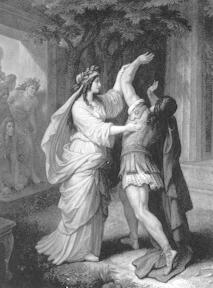O r e s t e s A t
A t h e n a' s T r i b u n a l

Orestes and the Furies
From Goethe's play Iphigenia
When Orestes came to his country,
years had passed.
He had been a wanderer in many lands,
always pursued by the same terrible shapes.
He was worn with suffering, but in
his loss of everything men prize there was a gain too.
"I have been taught by
misery," he said.
He had learned that no crime was
beyond atonement, that even he, defiled by a mother's murder, could be
made clean again.
He traveled to Athens, sent there
by Apollo to plead his case before Athena.
He had come to beg for help; nevertheless,
in his heart there was confidence.
Those who desire to be purified cannot
be refused and the black stain of his guilt had grown fainter and fainter
through his years of lonely wandering and pain.
He believed that by now it had faded
away.
"I can speak to Athena
with pure lips," he said.
The Goddess listened to his plea.
Apollo was beside him.
"It is I who am answerable
for what he did," he said. "He killed at my command."
The dread forms of his pursuers,
the Erinyes, the Furies, were arrayed against him, but Orestes listened
calmly to their demand for vengeance.
"I, not Apollo, was guilty
of my mother's murder," he said, "but I have been cleansed of my
guilt,"
These were words never spoken before
by any of the House of Atreus.
The killers of that race had never
suffered from their guilt and sought to be made clean.
Athena accepted the plea.
She persuaded the avenging Goddesses
also to accept it, and with this new law of mercy established they themselves
were changed.
From the Furies of frightful aspect
they became the Benignant Ones, the Eumenides, protectors of the suppliant.
They acquitted Orestes, and with
the words of acquittal the spirit of evil which had haunted his house for
so long was banished.
Orestes went forth from Athena's
tribunal a free man.
Neither he nor any descendent of
his would ever again be driven into evil by the irresistible power of the
past.
The curse of the House of Atreus
was ended.
Adapted from Mythology,
The House of Atreus
by Edith Hamilton
Back to the top
Copyright
©1998-2001 Roy George
|